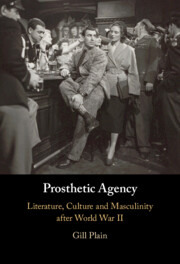Book contents
Chapter 5 - Unrepresentable Wounds
Nevil Shute, Hammond Innes and the Legacies of Damage
from Part II - Disability
Published online by Cambridge University Press: 29 June 2023
Summary
William Simpson’s repeated self-accounting is, at various stages, remarkable both for its avoidance of and its engagement with representations of the wounded male body. That he engages at all is striking: postwar fiction, even when deploying a disabled protagonist, was coy about the details of what it might mean to live with a non-normative body. For the most part, novels and feature films took an evasive approach to male damage, variously denying, displacing or romantically reconfiguring broken bodies and irreparable injuries. The wounded male body thus became simultaneously central and marginal: acknowledged but overwritten by reassuring narratives of recovery, agency or – in some cases – sacrificial death. These displacements take multiple forms but nearly always function, to a lesser or greater extent, as what David Mitchell and Sharon Snyder term a ‘narrative prosthesis’, ‘an opportunistic metaphorical device’ that draws attention not to disability itself but to some other state or transition.2 Above all, though, these bodies and plots seek to reassure and to comfort, and are integral to the normalising imperatives of the postwar.
- Type
- Chapter
- Information
- Prosthetic AgencyLiterature, Culture and Masculinity after World War II, pp. 168 - 205Publisher: Cambridge University PressPrint publication year: 2023



